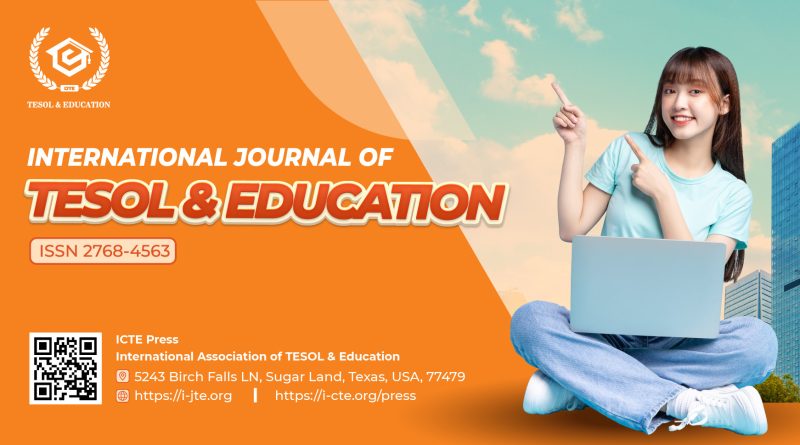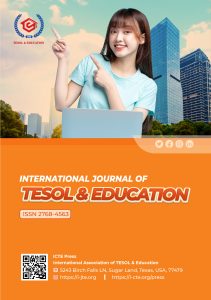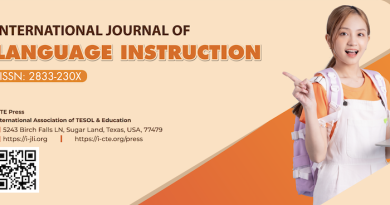TESOL & Education: Vol. 4 No. 3 (2024)
Full Issue (PDF)
Dear beloved TESOLers & Educators,
I am pleased to announce the publication of Volume 4, Issue 3, 2024 of the International Journal of TESOL & Education. This edition represents another significant step forward in our ongoing mission to advance research and practice in TESOL and Education. The papers in this issue demonstrate the range and depth of study that our magazine seeks to nurture.
In this issue, Quach Thi To Nu and Nguyen Loc investigated the use of accrediting standards in Vietnam’s tertiary general English programs. Their analysis concluded that present quality assurance systems are usually effective, but that there is room for improvement, particularly in terms of aligning these approaches with learners’ needs and curriculum effectiveness. The findings highlight accreditation’s potential for uniformity and continual development across institutions.
Ly Nguyen Minh Chau, Chu Tien Dat, Tran Thi Hue An, and Pham Que Anh investigated how YouTube affects English learning among students at Van Lang University. Their research discovered that YouTube efficiently boosts students’ motivation and autonomy, particularly in terms of increasing listening and speaking abilities, making it a viable teaching tool.
Nguyen Luu Diep Anh’s research focuses on the conceptual metaphor “MEDIA AS A TRAP” in Vietnamese and English online newspapers. By evaluating 200 metaphorical terms, the study uncovers both universal parallels and cultural variances in how media is viewed in these two languages, emphasizing the metaphor’s importance in molding public perception and communication across linguistic boundaries.
Dinh Anh Duc and Pham Nguyen Minh Chau investigated how non-English major students respond emotionally to teacher-written comments. The study discovered that tailored feedback had a substantial influence on students’ motivation, self-perception, and engagement. Positive feelings such as appreciation and thankfulness were frequently elicited, highlighting the value of empathy and clarity in feedback delivery.
Laelah Al Mubarokah investigated the professional identities of Indonesian English instructors via the lens of Global Englishes (GEs). The study discovered that, while GEs provide potential for cultural awareness and innovative education, obstacles such as native-speaker bias and insufficient resources impede their adoption. Teachers work through these issues to develop their identities as genuine English educators.
Tran Thi Mai studied the role of pop culture in teaching semantics to English students at Van Lang University. The study discovered that incorporating pop culture items improves students’ knowledge of semantic ideas and boosts engagement. Challenges include the necessity for instructors to keep up with swiftly changing pop culture trends.
Duong Thi Thu Huyen, Nguyen Thi To Hoa, and Hoang Tuyet Minh studied instructors’ attitudes toward adaptive learning at Vietnam National University in Hanoi. The study found various levels of comfort and familiarity with adaptive learning, emphasizing its potential advantages. However, it also underlined the importance of improved institutional support, resources, and focused professional development to ensure that adaptive learning practices are implemented effectively and have the most impact possible.
Tran The Phi and Nguyen Hoang Gia Khanh evaluated EFL learners’ reactions to conversational films at a language facility in Can Tho City. The study discovered that conversational films improve classroom engagement by increasing behavioral, emotional, and cognitive participation. The findings emphasize the potential for video resources to improve language learning experiences and student motivation.
Last but not least, Tran Thi Bich Tram and Vuong Tuyet Kha performed research at Van Lang University on the effect of mobile-assisted language learning (MALL) on learner autonomy among English majors. Over the course of ten weeks, they discovered that students made substantial use of mobile devices for autonomous learning, communication, and access to educational materials. The study emphasizes the need of incorporating MALL into EFL teaching to improve student autonomy and adapt to technology advances in language acquisition.
This achievement would not have been achieved without the great assistance of various essential players. First and foremost, I’d want to express my heartfelt appreciation to the writers who trusted us with their work. Their research, ideas, and innovations are the foundation of our publication, and their commitment to the field fuels our continuing success.
I’d also want to recognize our Editorial Board’s constant support. Their knowledge and assistance have helped shape the course of this publication, ensuring that we retain the highest levels of academic rigor and relevance.
Furthermore, I am very thankful to our Peer Reviewers, whose thorough and attentive reviews confirmed the quality and integrity of the articles published in this issue. Their dedication to a thorough and constructive review process is critical to our journal’s reputation for quality.
As we mark the publication of this book, I encourage all of our readers to engage thoroughly with the research presented and to continue contributing to the vibrant conversation that keeps our field so active and influential.
Thank you for your continuous support; we expect more innovative research in future issues.
Thanks be to God for everything!
Warm regards,
Associate Professor Dr. Pham Vu Phi Ho
Editor-in-chief


 DOI:
DOI: 

